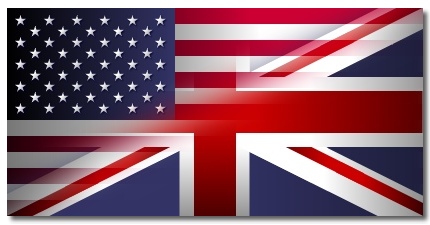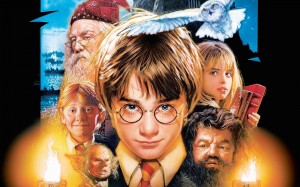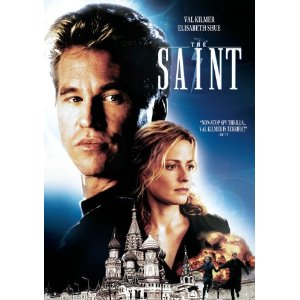The two largest film industries in the world (number of films produced and gross profit) are Hollywood (USA) and “Bollywood” (India). English is also the most widely-spoken language (it is also one of the three official languages of India), so it make sense that anyone producing a film to be released worldwide would want to at least make an English-dubbed version or even re-make it with English-speaking actors. This is a seemingly logical phenomenon, but it has its caveats as well. Let’s look at a few, shall we?
Harry Potter
The first Harry Potter book, Harry Potter and the Philosopher’s Stone, was published in London in 1997. In 1998, an edition was published in the US. However, the US publishers thought the US readers wouldn’t know what a “philosopher’s stone” is, and thought perhaps that images of Socrates holding a rock would be conjured up instead of a mystical, magical object, although the term “Philosophers’ Stone” has been in English-speaking lure many centuries. Regardless, the change went through and nobody batted an eye.
Fast-forward a few years, and we have Warner Bros. (Hollywood) in cooperation with UK film teams/actors unions starting the daunting task of filming J.K. Rowling’s epic book series, even before all the books have been written. And because Hollywood and the American-English-speaking community commands such a large portion of global viewership, every scene where the term “Philosopher’s Stone” was mentioned had to be recorded twice. Let that sink in. We have all these child actors and acclaimed UK actors and multi-million-dollar budgets, and the director is trying to capture the magic of a scene, and finally gets a good take. And then they do it again, reciting “Sorcerer’s Stone” instead of “Philosopher’s Stone.” This happened of course a lot in the first book/film, but the object was also mentioned in further books/films. This is the only example I can think of at the moment where US and UK versions of a film differ only in a few scenes, and only in the dialogue/dialog.
Oh yeah, and they made two version of the audio books, one UK-produced and the other US-produced, but both read by Englishmen. Go figure.
Funny Games
Also in 1997, an Austrian filmmaker released a rather dark thriller called Funny Games. It was filmed in German (the language of the Austrians, although with a distinct Austrian accent and some difference in vocabulary/vernacular [think British vs. American English]). It won some awards at film festivals around the world, and 10 years later, the creator of the film convinced someone in Hollywood to re-film the entire thing in English using English-speaking actors.,but he insisted on zero screenplay changes. The end result is a film filmed with the same cameras in the same locations using actors wearing the same clothes. Even the pacing of the film and the special effects are very close. But we have a seemingly Hollywood-produced American-English thriller. You can really watch the two films side-by-side and the cuts are nearly in the same place.
But the tale gets even funnier (if you’ll pardon the pun): Germans are notorious for dubbing all films into German using well-known German voice actors. These voice actors take their jobs very seriously and study and portray their actor counterparts so well that they are essentially assigned to an actor for their whole life. The German voice actor who portrays Bruce Willis in all his films, for example, commands a large salary and is very well-known in Germany for his voice-over work. Many Germans also claim that the voice-actor’s voice is even better than that of the real deal, Bruce himself.
So what was the decision the Germans made when importing Funny Games? You’d think they’d just have taken the original Austrian version, spoken in German, and maybe only have a few subtitles when the Austrian slang becomes less-than-understandable. Of course that would have made too much sense. Of course the Germans took the US Hollywood production and dubbed the voices over with German voice actors. They didn’t even use the voices of the original Austrian actors. I find this simply weird and unnecessary.
Films Done Right
It is, however, worth mentioning that some filmmakers successfully and, in my opinion, properly, bridge the English/international gap: the Indiana Jones series, The Mummy series, The Davinci Code series, Inglorious Basterds, The Saint, to name a few. In each of these films, people of other nationalities speak their native tongue when speaking with each other, and resort to English only when addressing English-only speakers or when speaking with characters of many tongues. I think it’s so great, for example, that in The Mummy, the ancient Egyptians speak an Arabic dialect thought to be used at that time. Never once do the ancient Egyptians speak English, because they would never have learned it. Even in the loosely-related The Scorpion King, the nomadic characters often speak in a desert-dialect believed to be used at that time (although much of the main dialog(u)e is in English).
The Saint is another classic that deserves a blog post in its own right, but I will mention that the main character, played by Val Kilmer, goes through a variety of foreign languages and accents quite convincingly. We see the character practicing his Russian in order to bluff the guards to gain entry into the Kremlin, and we see him portraying a homosexual German in the Berlin airport who converses with the local staff with ease. The film itself is very exciting, and it can also be inspiring for English-only-speakers to think that learning new languages can open a whole new world, even if (or perhaps especially if) that world is dangerous and full of excitement.



